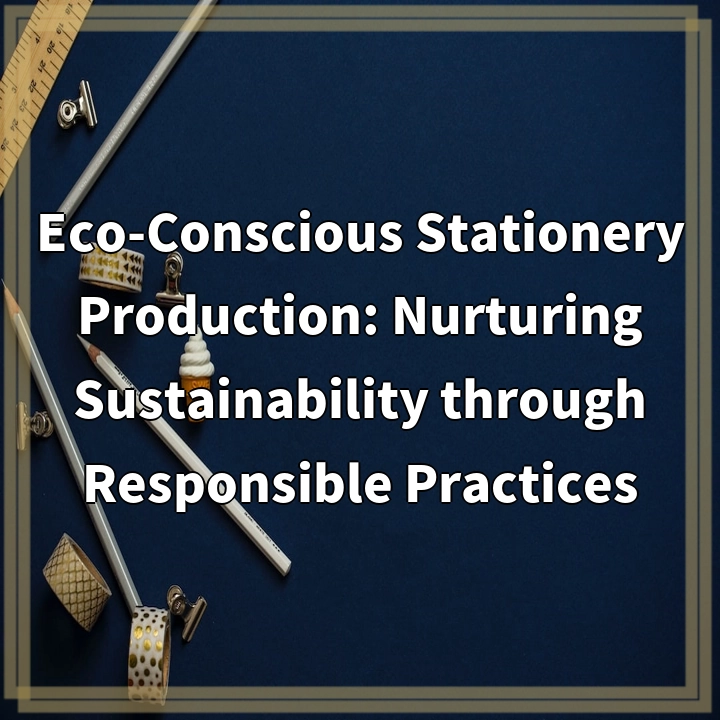
What is Eco-Conscious Stationery Production?
Eco-conscious stationery production refers to the practice of manufacturing and promoting stationery products in a manner that minimizes the impact on the environment and embraces sustainable principles. It involves using eco-friendly materials, reducing waste and pollution, and prioritizing ethical production processes. This approach aims to create stationery items that fulfill their intended purpose while minimizing their ecological footprint.
Real-World Problems Associated with Eco-Conscious Stationery Production
While the concept of eco-conscious stationery production is commendable, it is important to acknowledge the challenges and real-world problems that this industry faces in implementing sustainable practices. Some of these issues include:
1. Sourcing Sustainable Materials
The stationery industry relies heavily on materials such as paper, ink, and adhesive. The production of these materials often involves deforestation, chemical usage, and excessive water consumption. Finding sustainable alternatives or responsibly sourcing these materials can be a significant challenge.
2. Recycling and Waste Management
Stationery products contribute to the global waste problem. Discarded stationery items, such as used notebooks, pens, and packaging, often end up in landfills. Developing effective recycling systems and encouraging consumers to properly dispose of stationery items can be problematic.
3. Energy Consumption
The manufacturing process of stationery products often requires significant energy consumption, contributing to greenhouse gas emissions. Implementing renewable energy sources and improving energy efficiency in production facilities is essential to reduce the environmental impact.
4. Packaging and Transportation
The packaging and transportation of stationery products involve the use of additional resources and generate carbon emissions. Finding ways to optimize packaging materials, adopt low-carbon transportation methods, and reduce overall packaging waste are ongoing challenges.
5. Consumer Awareness and Behavior
Despite growing demand for eco-conscious stationery products, consumer awareness and adoption of sustainable alternatives can still be limited. Educating consumers about the importance of making environmentally-friendly choices and encouraging responsible purchasing behavior are essential to drive the market towards sustainable options.

Solutions for Eco-Conscious Stationery Production
Addressing the real-world problems associated with eco-conscious stationery production requires innovative solutions and collective efforts. Here are some strategies that can help nurture sustainability in this industry:
1. Promoting Sustainable Material Sourcing
Encourage the use of recycled paper and sustainably sourced materials for stationery production. This includes exploring alternatives such as tree-free paper, vegetable-based inks, and non-toxic adhesives. Collaboration with suppliers and certification programs can help ensure responsible sourcing practices.
2. Implementing Effective Recycling and Waste Management Systems
Develop comprehensive recycling programs for stationery products, including collection points and partnerships with recycling facilities. Promote responsible disposal by educating consumers about recycling options and the importance of minimizing waste. Consider using packaging materials made from recycled or biodegradable materials.
3. Embracing Renewable Energy and Energy Efficiency
Transition to renewable energy sources such as solar or wind power for stationery manufacturing facilities. Implement energy-saving practices, such as installing energy-efficient machinery, optimizing production processes, and monitoring energy consumption. Work towards achieving carbon neutrality in operations.
4. Sustainable Packaging and Transportation
Optimize packaging design to reduce material usage and waste. Explore options such as biodegradable or compostable packaging materials. Minimize carbon emissions by optimizing transportation routes, utilizing eco-friendly modes of transportation, and consolidating shipments to reduce packaging waste.
5. Educating and Engaging Consumers
Raise awareness among consumers about the environmental impacts of stationery production. Provide information on sustainable alternatives and the benefits of choosing eco-conscious stationery products. Collaborate with retailers and educators to promote responsible purchasing habits and encourage the reuse or repurposing of stationery items.















